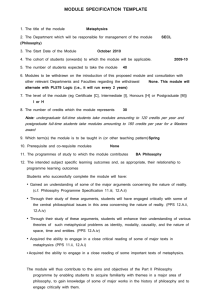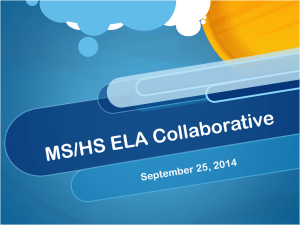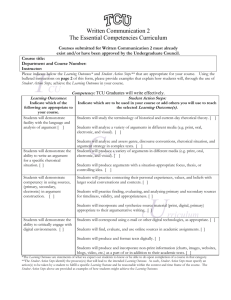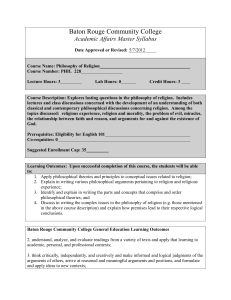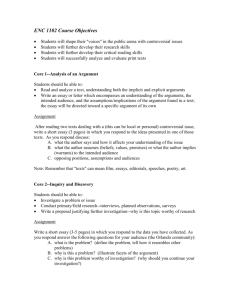Phil 2020: Introduction to Logic Instructor: Mr
advertisement
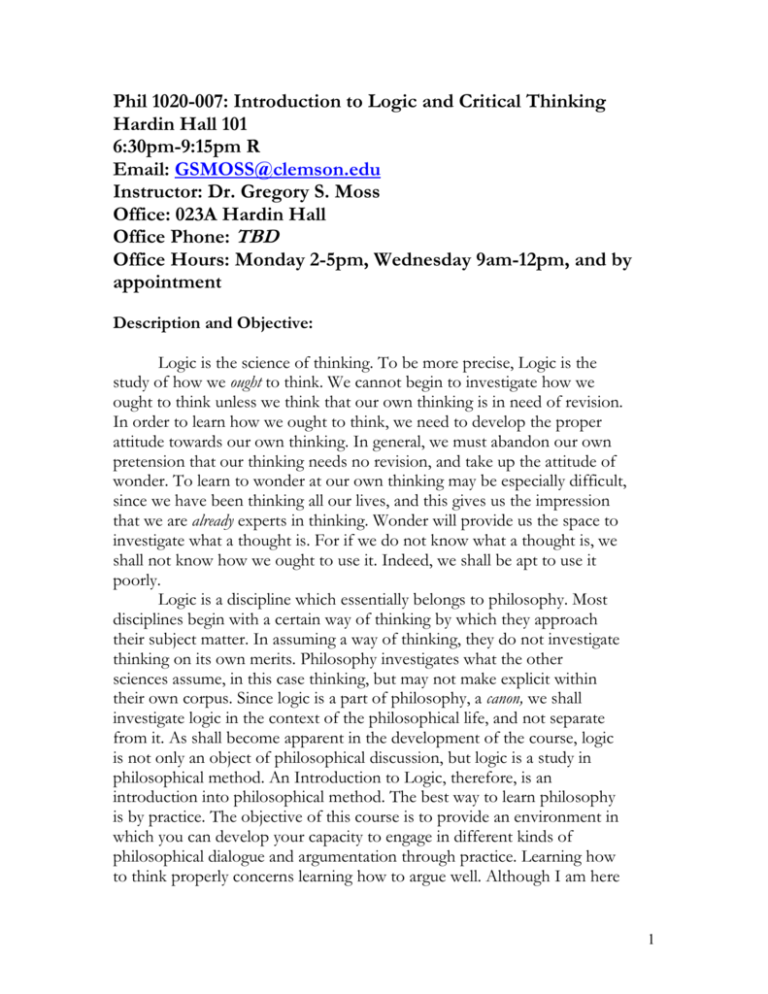
Phil 1020-007: Introduction to Logic and Critical Thinking
Hardin Hall 101
6:30pm-9:15pm R
Email: GSMOSS@clemson.edu
Instructor: Dr. Gregory S. Moss
Office: 023A Hardin Hall
Office Phone: TBD
Office Hours: Monday 2-5pm, Wednesday 9am-12pm, and by
appointment
Description and Objective:
Logic is the science of thinking. To be more precise, Logic is the
study of how we ought to think. We cannot begin to investigate how we
ought to think unless we think that our own thinking is in need of revision.
In order to learn how we ought to think, we need to develop the proper
attitude towards our own thinking. In general, we must abandon our own
pretension that our thinking needs no revision, and take up the attitude of
wonder. To learn to wonder at our own thinking may be especially difficult,
since we have been thinking all our lives, and this gives us the impression
that we are already experts in thinking. Wonder will provide us the space to
investigate what a thought is. For if we do not know what a thought is, we
shall not know how we ought to use it. Indeed, we shall be apt to use it
poorly.
Logic is a discipline which essentially belongs to philosophy. Most
disciplines begin with a certain way of thinking by which they approach
their subject matter. In assuming a way of thinking, they do not investigate
thinking on its own merits. Philosophy investigates what the other
sciences assume, in this case thinking, but may not make explicit within
their own corpus. Since logic is a part of philosophy, a canon, we shall
investigate logic in the context of the philosophical life, and not separate
from it. As shall become apparent in the development of the course, logic
is not only an object of philosophical discussion, but logic is a study in
philosophical method. An Introduction to Logic, therefore, is an
introduction into philosophical method. The best way to learn philosophy
is by practice. The objective of this course is to provide an environment in
which you can develop your capacity to engage in different kinds of
philosophical dialogue and argumentation through practice. Learning how
to think properly concerns learning how to argue well. Although I am here
1
to facilitate your learning, I cannot apply those principles for you. For this
reason, you will not succeed in Introduction to Logic without practice in
applying the principles. Through practicing these skills, you will not only
become a better logician, but a better philosopher as well.
Since philosophy is the inquiry into the Truth, and we ought to treat
logic in the context of philosophy, the particular theme of this course is the
relation of logic to truth. On the one hand, by fixing on a theme, we shall be
better able to hone our abilities to think about one topic. On the other hand,
this theme provides a convenient theoretical positioning from which
inquires into other areas of philosophy, e.g. Metaphysics, Epistemology,
Philosophy of Language, Philosophy of Mind, may be addressed. These
other sub-disciplines affect how we understand what logic is, and demand
that we consider them in an Introduction to Logic. The following is a
sampling of questions we shall raise in the investigation of logic: What is
logic? Is logic possible? How do different conceptions of a concept affect
and alter what concepts can be employed to know? How has our
understanding of thinking changed over time? What are some major
objections to these historical understandings? To what do principles of
logic refer? For example, do they refer to things, ideas, words, or
something else? How can we distinguish logic from rhetoric, speech
communications, psychology, and other seemingly related disciplines?
Why is Formal Logic, a kind of logic, required in philosophical institutions?
What are the general limits of logical thinking? These are only a few
questions upon which this course will embark.
In order to help us explore this theme, we shall appropriate a few
great thinkers in the history of philosophy in the western tradition.
Learning anything from these texts requires close reading on your part. In
general, I suggest three readings. As you read, the most important thing
that you can do to improve your understanding of the text is to seek out the
arguments the author is making for the position that he/she takes, and
developing objections to the arguments presented. Thereafter you should
return to the text and ask yourself how the author might respond to your
objections. Learning to read actively will be the key to writing successful
papers and exams.
In sum, this course concerns learning how to read
critically, just as much as it concerns learning how to think well.
I can neither force you to think rationally, nor can I force you to
consider alternative ways of thinking that may change your life. Only you
can do that. Learning is thereby an independent activity, which I am here to
facilitate. Let the great German philosopher Immanuel Kant provide us with
the motto of the course from his essay on Enlightenment: ‘Have the
2
courage to use your own understanding!’. This process is not easy, but can
be very rewarding. As a consequence, you might even find that the
knowledge you acquire in this course could even transform you.
Required Texts:
I. Author: Plato
Title: Five Dialogues
II. Author: Aristotle
Title: Posterior Analytics
III. Author: A.J. Ayer
Title: Language, Truth, and Logic
Assignments:
Argument Critique I (3-6 pages) 10% (40pts)
Argument Critique II (3-6 pages) 15% (60pts)
Homework 25% (100pts)
Socratic Encounters Project 5% (20pts)
Media Project 5% (20pts)
Mid Term Exam (cumulative) 15% (60pts)
Final Exam (cumulative) 25% (100pts)
TOTAL POINTS: 400
Grade Criteria:
A:
The student knows the authors positions, and proves this knowledge by
knowing the argument(s) supporting the theses in the text. Student evidences
self-initiated thinking and understanding of the arguments through his/her ability
to present her own counter-arguments and possible replies to counterarguments. The student exhibits thorough understanding of the relations of the
themes presented in the various texts.
3
B:
The student knows the authors positions, and generally understands the
arguments supporting them. Student has difficulty developing her own
criticisms and rebuttals to criticism. The student exhibits relatively complete
understanding of the relations of the themes presented in the various texts.
C:
The student shows the ability to properly relay information about the text and
the positions contained therein, but has difficulty re-constructing the
arguments, presenting counter-arguments, and criticism. Student has a difficulty
understanding arguments. The student shows an incomplete understanding of
the relations of the themes presented in the various texts.
D:
The student cannot explicate the positions or the arguments for such positions
in the text. The student exhibits seriously incomplete understanding.
F:
The student exhibits all the failures mentioned under ‘D’. The student earns an
F by having a blatant disregard for the great masters of the global philosophical
traditions by not reading and not attending lectures.
Grade Scale:
A: 90-100%
B: 80-89%
C: 70-79%
D: 60-69%
F: < 60%
Participation:
Two unexcused absences are permitted. For each unexcused absence beyond
two, one-half a letter grade will be deducted from your final grade. In case of
emergencies, either notify me of your absence ahead of time, or plan to bring
some formal documentation of your absence. Without documentation, I will
not accept absences as excused. All technology, including laptops and cell
4
phones, must be turned off during our meeting hours. If you violate this
technology policy in any way after class has officially begun, I reserve the right
to count you as absent. If you miss more than six classes, I reserve the right to
drop you from the course.
Readings:
Read and study each assignment before class meetings. You are responsible not
only for all written assignments, but also for having completed each reading
assignment. Helpful contributions to class discussions require completion of
homework, and close readings of the text before we discuss them.
August
21 Introductory Lecture/Plato, Apology
September
28 Plato, Apology HW I DUE/Plato, Euthyphro {DROP/ADD Deadline}
4 Aristotle, Posterior Analytics HW 2 DUE
11 Aristotle, Posterior Analytics HW 3 DUE
18 Aristotle, Posterior Analytics HW 4 DUE/ARGUMENT CRITIQUE I
DUE
25 The Ancient Square of Opposition/Venn Diagrams on the Ancient Model
HW 5 DUE
October
2 Socratic Encounters Practice (Handout From Aristotle’s Topics) HW 6 DUE
9 MID TERM EXAM/Stoic Logic (Handout)
<Review Session: TBD>
10 MIDTERM EVALUATIONS DUE)
16 Lecture on the Transition to Modern Logic/ The Modern “Square of
Opposition” HW 7 DUE
23 Venn Diagrams on the Modern Model HW 8 DUE
24 (WITHDRAWAL DEADLINE)
30 Ayer, Language Truth and Logic
November
6 Ayer, Language Truth and Logic HW 9 DUE /SOCRATIC ENCOUNTERS
DUE
13 Ayer, Language Truth and Logic HW 10 DUE
20 Media Presentations
December
4 Media Presentations ARGUMENT CRITIQUE II DUE
Grades Due: December 15th
5
FINAL EXAM DATE: TBD (Dec. 8-12)
<Weekend Review Session: To Be Determined>
Academic Integrity
“As members of the Clemson University community, we have inherited
Thomas Green Clemson’s vision of this institution as a “high seminary of
learning.” Fundamental to this vision is a mutual commitment to truthfulness,
honor, and responsibility, without which we cannot earn the trust and respect of
others. Furthermore, we recognize that academic dishonesty detracts from the
value of a Clemson degree. Therefore, we shall not tolerate lying, cheating, or
stealing in any form.”
Note: No work from a previous course will be accepted in this course.
Disability Access Statement:
Students with disabilities requesting accommodations should make an
appointment with Dr. Arlene Stewart (656-6848), Director of Disability
Services, to discuss specific needs within the first month of classes. Students
should present a Faculty Accommodation Letter from Student Disability
Services when they meet with instructors. Accommodations are not retroactive
and new Faculty Accommodation Letters must be presented each semester.
Exams/Essays/Project:
Exams will contain two sections. One section will consist of short answer
questions, in which you will be asked to provide arguments for particular
conclusions elicited from the texts. You will not be asked to provide arguments
for any conclusions except those which are discussed in class. The second
section will consist of long-essay questions in which you will re-construct the
position and the arguments of a philosopher(s) on a particular theme, e.g.
‘Being’. You will also be asked to critique these arguments and relate them to
other philosophers and texts that we have discussed.
Argument Critiques:
Argument Critiques consist of three parts. In respect to the papers, I shall
provide you with passages from the texts which we are reading, and I will ask
you to choose one passage to work on. You will formulate the argument
6
contained in that passage, and formulate a critique of that passage. The last
stage consists in formulating a reply to the criticism that you raise. I encourage
you to utilize the texts that we are reading in formulating your criticisms.
Socratic Encounters:
Socratic Encounters require you to engage other persons outside of class in a
Socratic conversation. The purpose of the Socratic encounter is to develop the
capacity to engage in philosophy outside of the classroom and in public, and
especially with persons who are not necessarily philosophically inclined. The
assignment teaches the student how to ask questions, and to construct
arguments by asking questions. These conversations shall be highly regulated,
and the rules pertaining to which shall be given in handouts.
The Media Project:
The Media Project consists of two parts. First, you will be required to find a
sample of a speech, dialogue, article, or the like from the media, e.g.
newspapers, online video feeds, websites, news channels (CNN, FOX NEWS,
MSNBC, etc…), and explicate the speaker’s argument. Second, you will analyze
the speech for logical fallacies, either formal or informal. You will present your
results to the class.
Late Work/Make-Ups:
Late papers will be penalized one-half a letter grade for each day the paper is
tardy. I will only give a make up, exam if the absence is approved in advance or
you provide evidence that an emergency prevented you from attending class. I
will always be willing to discuss your grade with you. If you would like a grade
changed, you must provide me with a detailed written argument for why you
think it should be changed, otherwise I will not consider it.
Equal Opportunity Statement
Clemson University is committed to a policy of equal opportunity for all
persons and does not discriminate on the basis of race, color, religion, sex,
sexual orientation, gender, pregnancy, national origin, age, disability, veteran’s
status, genetic information or protected activity (e.g., opposition to prohibited
discrimination or participation in any complaint process, etc.) in employment,
educational programs and activities, admissions and financial aid. This includes
a prohibition against sexual harassment and sexual violence as mandated by
7
Title IX of the Education Amendments of 1972. This policy is located at
http://www.clemson.edu/campus-life/campus-services/access/title-ix/. Mr.
Jerry Knighton is the Clemson University Title IX Coordinator. He also is the
Director of Access and Equity. His office is located at 111 Holtzendorff Hall,
864.656.3181 (voice) or 864.565.0899 (TDD).
GENERAL EDUCATION MISSION STATEMENT:
Academic institutions exist for the transmission of knowledge, the pursuit of
truth, the intellectual and ethical development of students, and the general
well-being of society. Undergraduate students must be broadly educated and
technically skilled to be informed and productive citizens. As citizens, they
need to be able to think critically about significant issues. Students also need
to be prepared to complete undergraduate work and a major course of study.
Logic and critical thinking develops our communication and critical
thinking skills, which are core competencies of general education at
Clemson. The main competencies developed in this course are in
bold below:
GENERAL EDUCATION COMPETENCIES:
A. Arts and Humanities
Demonstrate an understanding of the arts and humanities in historical
and cultural contexts.
B. Mathematics
Demonstrate mathematical literacy through solving problems, communicating
concepts, reasoning mathematically, and applying mathematical or statistical
methods, using multiple representations where applicable.
C. Natural Sciences
Demonstrate scientific literacy by explaining the process of scientific
reasoning and applying scientific principles inside and outside of the
laboratory or field setting.
D. Social Sciences
8
Demonstrate an understanding of social science methodologies in order to
explain the consequences of human actions.
E. Cross-Cultural Awareness
Demonstrate the ability to critically compare and contrast world cultures in
historical and/or contemporary contexts.
F. Science and Technology in Society
Demonstrate an understanding of issues created by the complex interactions
among science, technology, and society.
G. Communication
Effective oral and written communication is the means by which all
competencies will be demonstrated.
H. Critical Thinking
Demonstrate the ability to assemble information relevant to a significant,
complex issue, evaluate the quality and utility of the information, and
use the outcome of the analysis to reach a logical conclusion about the
issue.
I. Ethical Judgment
Demonstrate an ability to identify, comprehend, and deal with ethical
problems and their ramifications in a systematic, thorough, and responsible
way.
9



